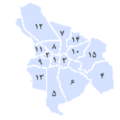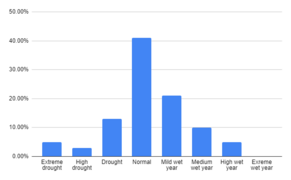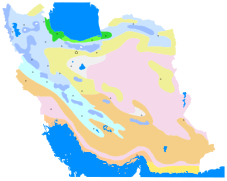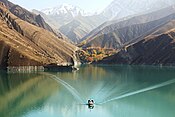Ecology in Isfahan
| Isfahan city |
|---|
 |
There are two national animal conservation parks close to Isfahan Kolah ghazi park in south east and Ghamishloo park in North west.Isfahan city is 550 square kilometers with 136 square kilometers in suburbs.Average altitude is 1607 meters from sea level.(Isfahan province average altitude is 1563 meters from sea leve) Based on report from Isfahan region water corporation there are 14 water tunnels crossing Isfahan.Water projects related to the city are Yazd water transfer pipeline, Koohrang, Kouhrang 2 Hydroelectric Power Station, Kouhrang 1 Dam, Kouhrang 3 Dam[1]
-
1972 to 2009 abundance percentage of years of drought and wet periods data isfahan atlas
-
Isfahan city greenspace share atlas data 2020
-
Map iran biotopes simplified-fr
-
Iran climate map
Two main types of drinking water sources in the city are wells and Zayanderud dam. There are almost 310 kilometers of canals & aqueducts in Isfahan city. Mount Soffeh is the highest point in the city with 2216 meters. In 2013 Isfahan had only 2 days with clean air. There are 13 Air quality index metric sense stations inside Isfahan. The city has a population of1980,000 creating almost 864 tons of waste daily, 436 grams per citizen. Isfahan compost fertilizer factory recycles 650 tons a day & ranks first in the country.[2] Gavkhouni is in the east of Isfahan city.[3][4] The city has 5200 hectare green space %35 of which is irrigated by using wastewater reuse from 2 wastewater treatment plants in Sepahan Shahr(south of city), Shahin Shahr(north of city).By 2020 %52(1820 hectare) of city green space is using Micro-irrigation[5]Isfahan Department of Environment (Iran) was established in 1972 to conserve biodiversity.[6] For combating drought the city is switching toward xeriscaping lawn resistant to water scarcity.[7]
Further reading
- City green space program view on sustainablity Case study district 3 of Isfahan[8]
See also
External links
- Department of Natural Resources and Watershed Management of Isfahan
- Isfahan Department of Environment
- http://park.isfahan.ir/madiha
- http://park.isfahan.ir/parklocations
References
- ^ "manabe ab" (PDF). Atlas for Isfahan. Archived (PDF) from the original on 2020-10-08. Retrieved 2020-10-08.
- ^ "اطلس اصفهان". new.isfahan.ir. Archived from the original on 2020-09-22. Retrieved 2020-10-07.
- ^ "بیش از ۲ هزار گونه گیاهی و جانوری در استان اصفهان وجود دارد". ایمنا (in Persian). 2020-05-21. Archived from the original on 2020-10-08. Retrieved 2020-10-08.
- ^ Walsh, Bryan. "The Visible Effects of Climate Change in Iran". Time. Archived from the original on 2020-08-07. Retrieved 2020-10-08.
- ^ "مدیریت منابع برای فضای سبز اصفهان در اولویت برنامهریزی شهری". ایمنا (in Persian). 2020-10-05. Archived from the original on 2020-10-08. Retrieved 2020-10-08.
- ^ "about the department of environment isfahan province".
- ^ "شناسايي گونه هاي گياهي متناسب با اقليم اصفهان". new.isfahan.ir. Archived from the original on 2020-10-08. Retrieved 2020-10-08.
- ^ "Archived copy" (PDF). Archived (PDF) from the original on 2020-10-08. Retrieved 2020-10-08.
{{cite web}}: CS1 maint: archived copy as title (link)






